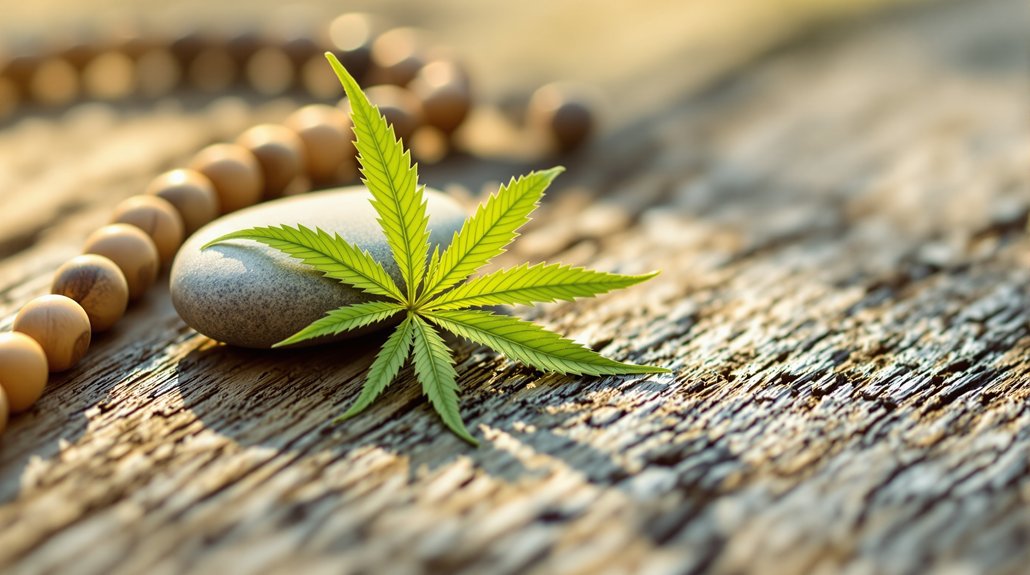Cannabis users report enhanced meditation experiences, but scientists remain divided on whether marijuana actually improves mindfulness or simply creates the illusion of deeper awareness. Recent studies suggest THC and CBD affect brain regions linked to present-moment attention differently than expected. Some practitioners claim heightened focus and reduced mental chatter during sessions. Others experience increased distraction and anxiety. The stakes couldn’t be higher, millions seek meditation’s stress-relief benefits, yet little research examines this controversial combination’s true neurological impact.
The Science Behind Cannabis-Enhanced Mindfulness: What Research Reveals

Researchers studying the intersection of cannabis use and mindfulness practices have uncovered a complex web of cognitive and emotional interactions that challenge simplistic assumptions about their combined effects.
The science reveals mixed results that depend heavily on individual mindfulness traits and experience levels.
Studies show cannabis affects dispositional mindfulness differently across users. Those with non-judgmentally aware profiles experience more adaptive outcomes compared to other mindfulness types.
However, individuals with high observing traits but limited meditation experience may face maladaptive consequences.
A controlled study of 47 adults found that combining cannabis with yoga markedly increased mystical experiences and present-moment focus compared to typical post-consumption activities.
Yet researchers emphasize that factors like structured mindful practices considerably influence outcomes, making the relationship far more nuanced than initially assumed. Research on college students with recent cannabis use identified three distinct profiles of dispositional mindfulness, with the judgmentally observing group showing higher rates of problematic cannabis behaviors.
Conversely, clinical interventions combining motivational interviewing with mindfulness meditation have demonstrated significant reductions in marijuana use among young adult females, suggesting that structured therapeutic approaches may offer more beneficial outcomes than casual combined use.
Set and Setting: How Context Shapes Your Cannabis Meditation Experience
The laboratory findings tell only part of the story, how cannabis affects meditation depends heavily on where, when, and how someone consumes it. Researchers have identified set and setting as essential variables determining whether users experience enhanced mindfulness or unwanted anxiety.
Mental preparation proves particularly influential. Studies show positive expectations and intentional use dramatically increase mindful outcomes compared to aimless recreational consumption. Pre-existing mood states can make or break the session, emotional readiness matters more than dosage alone. Setting intentions provides meaning and purpose, helping to guide the meditation experience without rigid control.
Physical environment shapes everything from focus depth to paranoia risk. Comfortable, distraction-free spaces with soft lighting and calming music consistently produce better results than chaotic settings. Current practices emphasize aesthetically welcoming environments that minimize external stressors and maximize therapeutic potential.
Group meditation sessions with cannabis showed markedly higher mindfulness scores than solo practice, suggesting social support amplifies benefits while buffering potential negative experiences.
The Double-Edged Sword: Benefits and Risks of Combining Weed With Mindful Practices

Why do millions of meditation practitioners increasingly turn to cannabis as their spiritual companion, despite centuries of substance-free contemplative traditions? Research reveals compelling benefits alongside serious risks in this emerging practice.
Cannabis can decrease anxiety and reduce mental rumination, with 66.1% of users reporting subjective spiritual benefits when combining it with meditation. The plant amplifies state mindfulness by increasing awareness of mental states and bodily sensations. Users experience deeper relaxation, improved concentration, and mystical experiences mirroring psychedelic effects. Cannabis enhances circulation and blood flow to the brain, potentially supporting the neurological aspects of meditative focus.
However, excessive consumption presents significant dangers. THC-rich strains may impair memory and attention, disrupting sustained mindfulness. Some practitioners develop dependence, relying continuously on cannabis to access meditative states.
Unsuitable strains can trigger anxiety, paranoia, or dissociation rather than presence. The endocannabinoid system plays a crucial role in regulating mood and stress responses during meditation sessions. Cannabis allows practitioners to release more deeply into meditation postures, easing physical discomfort that might otherwise distract from mindful awareness.
The key lies in strain selection and dosage control for harm reduction.
Beyond the Hype: Research Gaps and What We Still Need to Learn
While millions embrace cannabis-enhanced meditation as a pathway to deeper spiritual states, the scientific foundation supporting this practice remains thin.
Most research relies on small pilot studies rather than large-scale randomized controlled trials, creating a shaky evidence base. The correlation between cannabis use and meditation quality shows only weak positive results at r = 0.19.
The evidence supporting cannabis-enhanced meditation rests on limited pilot studies with weak correlational findings rather than robust clinical research.
Methodological problems plague existing studies. Researchers rarely control for set and setting variables or account for different cannabis strains and dosing methods.
Sample selection bias limits findings to narrow populations like college students. Critical questions remain unanswered about long-term cognitive impacts and dose-response relationships.
The field desperately needs longitudinal studies with diverse populations and standardized measurement tools to move beyond anecdotal claims. Recent clinical trials targeting frequent cannabis users have begun incorporating mindfulness-based interventions, but research specifically examining cannabis-enhanced meditation remains limited.










